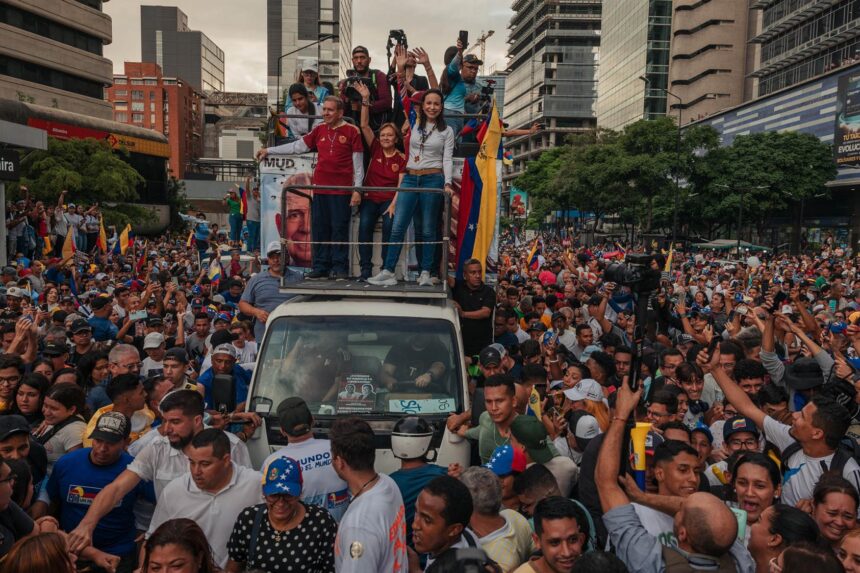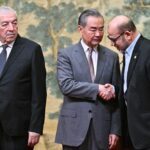Summary by Geopolist | Istanbul Center for Geopolitics:
The recent announcement of direct negotiations between Venezuela and the U.S. is seen as a significant opportunity to ensure a peaceful and democratic outcome for the July 28 election. For the election to be effective, it is crucial that neither side faces persecution post-election and that power alternation is possible rather than a continuation of single-party rule.
Key challenges include the opposition candidate, Edmundo González Urrutia, who leads in polls but faces potential threats from the ruling regime. The government, concerned about his backing by Maria Corina Machado and his potential victory, might attempt to sabotage his candidacy through various means, including invalidating his ballot.
The U.S. should avoid a purely transactional approach and focus on facilitating a process that ensures a smooth transition of power and non-persecution of the election’s loser. This includes offering credible non-persecution guarantees and supporting both sides in reaching a sustainable agreement. Actions could involve lifting sanctions, recognizing election outcomes, and fostering a supportive international environment. Long-term stability will depend on continuing diplomatic efforts and creating conditions for genuine national reconciliation.
Read more below.
A Negotiated Solution
Recent Venezuelan history has been through many phases, some hopeful, some of despair. But the current election is seen by many as having the greatest potential in many years to finally reset the country’s political and economic foundations and move progress forward on both fronts. To do so, the crisis must be viewed as a lengthy process of national reconciliation rather than a single election with a winner and loser. The requirements for success in such a framework become both more challenging but also much clearer.
The current election is seen by many as having the greatest potential in many years to finally reset the country’s political and economic foundations.
Clearly the opposition, and its international supporters such as the United States, will need to assertively support the process leading to a free and fair election, and not turn a blind eye to such anti-democratic measures. But the United States should recognize that a negotiated solution to the Venezuelan crisis cannot be a capitulation of the government nor the unconditional surrender of the opposition. National or international initiatives that seek to contribute to solving the Venezuelan political conflict should start from the premise that any of the candidates can win. They cannot assume Maduro will lose and, based on that assumption, decree a political transition. This would close the path to a political agreement with the government that facilitates the alternation of power.
The U.S. Role in Peaceful Democratic Co-Existence
In the resumption of direct negotiations between the White House and the Maduro administration, a purely transactional approach — with the U.S. offering, for example, to unblock funds in exchange for allowing Edmundo González to continue in the presidential race — was never the key. The key rather lies in the higher-level issue of breaking the deadlock and facilitating the alternation of power by ensuring no persecution of the election’s loser, who will be left unprotected once they hand over power.
By supporting a viable and credible offer of non-political persecution guarantees, the U.S. can help clear the uncertainty and threat of post-electoral conflict.
- First, there is what the U.S. directly controls that can be put in play. The U.S. should make a pragmatic and credible offer to the regime, which includes lifting the bounty as part of the narcotics rewards programs and other personal sanctions on Maduro and other senior officials. The U.S. should also be prepared to recognize a potential Maduro victory if validated by national and international electoral observation.
- Second, there are things the U.S. can influence indirectly. For example, without dictating terms, the U.S. can support the opposition and the Venezuelan people as they work through the difficult issues of justice and accountability. The opposition will likely need to socialize some form of amnesty and non-persecution guarantees before the election so they can be made viable in the period between the election and the inauguration.If those in government face electoral defeat followed by a wave of persecutions, trials and convictions, they will prefer to cling to power to avoid such a tragedy. The U.S. could be prepared, for example, to support an opposition decision to appoint former presidents, including Nicolas Maduro, as a deputy to the parliament of MERCOSUR, the South American trade bloc, with parliamentary immunity.With parliamentary immunity, the absence of persecution would be assured and the Chavismo movement could compete to regain political control in the next elections, similar to what was done in Chile when Pinochet negotiated his appointment as senator for life with parliamentary immunity and his continuation as commander-in-chief of the army. In Nicaragua, Daniel Ortega lost the presidential election to Violeta Chamorro but negotiated the continuity of his brother, Humberto Ortega, as minister of defense to maintain influence over the security forces and freedom from political persecution of the state against the Sandinistas. And Nelson Mandela, when he won the presidency of South Africa in 1994, accepted that Frederic de Klerk, the president of the racially segregated apartheid regime, would continue until 1996 as vice president of his government in order to contribute to a peaceful and smooth transition without persecution.
Facilitating the alternation of the Venezuelan presidency also involves eliminating indefinite re-election and reducing the term to four years with only one immediate re-election. This would send an important message to a Chavismo base that does not want to wait too long to aspire to regain power.
While such guarantees for Maduro will often not align with the immediate preferences of the U.S., its longer-term interests in a peaceful, stable Venezuela with migrants returning home rather than leaving, will be better served by this course of action.
- Third, the U.S. can help to bring along other international partners. There is general consensus among the international community in favor of a peaceful electoral solution, but no firm consensus on how to achieve it. The U.S. could help to convene other actors around this kind of a bold and aggressive new policy. Colombia and Brazil, seen as allies to the regime, have been very active in reaching out to Maduro and proposing options for democratic guarantees that lead to a transition pact. However, the U.S. and the international community need to foresee this option as a long-term strategy, not a surge of short-term energy only for this election. There will have to be a long process of diplomatic accompaniment, during the post-election and post-inauguration periods, focusing on opening up further spaces of dialogue and mutual recognition between a broadened opposition and Maduro.
We are in the final stretch of a very complicated electoral campaign that is just the beginning of an even longer process of national reconciliation for Venezuela. By supporting a viable and credible offer of non-political persecution guarantees, the U.S. can help clear the uncertainty and threat of post-electoral conflict, allowing Maduro and Edmundo González to compete, knowing they and their movement will survive the contest.
By: Victor Alvarez – an economist and writer living in Caracas. He was the winner of the National Science Award and director of the Project on Elections Education.
Source: USIP







